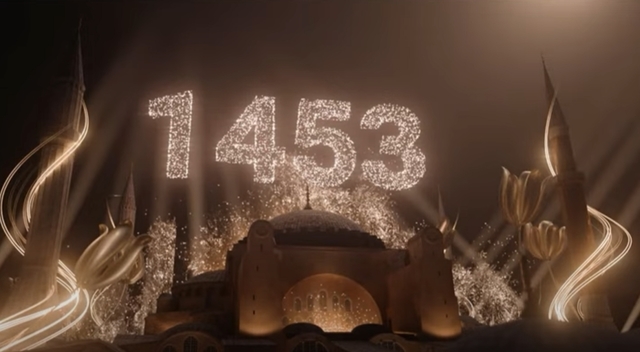At the end of last week, Muslims in Turkey and other places who understand the significance of this event celebrated the anniversary of the conquest of Constantinople-Istanbul by the army of Sultan Mehmed the Conqueror in 1453. Our Lord, the Seal of the Prophets and the Crown of Creation, may Allah bless him and grant him peace, said: «Constantinople will definitely be conquered, and how great is this army and how great is this Amir (who conquers it). That is why, since the time of the Messenger of Allah, may Allah bless him and grant him peace, some Sahabah tried unsuccessfully to do so, saturating the soil with their blessed blood, on which a beautiful garden of Islam would flourish a century later.
What was the significance of the Muslims’ conquest of this city, which today is not considered by many to be the capital of Turkey, but simply an important tourist and business center in its territory? At that time, this city was essentially the center of Rum — a civilization that is given special significance not only by historians but also in the Hadith. After the division of the Roman Empire into western and eastern parts, the first part was destroyed by the Germans, while the second part continued to exist.
And then, after the second part was destroyed by the warlike Turkic tribes with the addition of Muhajirs from other nations, a new civilization was created in its place, just as the Germans created a new civilization in the western part of the Roman Empire. Interestingly, these two historical vectors are paradoxically linked. The Muslim conquest of Constantinople and its territories put an end to the old Roman Empire not only in its eastern part, but also in its western part, i.e. in modern Europe. As the Arabs penetrated not only on the southern but also on the northern shores of the Mediterranean, the connection that had been maintained between the western and eastern parts of Rum began to weaken. However, as long as Byzantium, the Eastern Roman Empire, retained its Mediterranean possessions, its western part, conquered by the «barbarians» — the Germans — remained in its shadow. And only after the Ottomans dealt a devastating blow to the Eastern Roman Empire and established control over their part of the Mediterranean, the northern peoples, who had previously led a miserable existence, came to the fore in Europe.
Thus, both the Germans and the Turks did roughly the same thing in their respective parts of ancient Rum. And by the way, it is important to understand how this relates to Russia and its relations with both the West and the Islamic world. And it concerns them directly, because from the very beginning of the conversion of some Slavic peoples to the Eastern, i.e. Byzantine version of Christianity — Orthodoxy, and not the Western version like the Germans (Catholicism and later Protestantism), Orthodox missionaries indoctrinated them that they should become the «Third Rome». Instead, they became those who founded Western civilization in the West and Islamic civilization in the East.
That is why Russia, obsessed with the idea of «Moscow as the Third Rome,» aspires to both the West and Istanbul-Constantinople, the conquest of which was the goal of Russian imperial policy for several centuries. But Allah preserved this city for the Muslims, although there was a moment at the turn of the 19th and 20th centuries when it seemed that it might be lost.
But let’s go back to the actual conquest of Constantinople by Sultan Mehmed the Conqueror and his army. This was an event of colossal proportions that shook the entire Orthodox world, and it remains a trauma for the revanchist part of it to this day. And, of course, it could not have happened just like that, neither from a historical nor from a spiritual point of view. Just imagine — not so long ago, wild tribes were able to essentially conquer the center of the world at that time.
Allah says in the Koran: «…The earth will be inherited by My righteous servants» (Translation of the Meanings of the Qur’an, Surah Al-Anbiya, verse 105). But it was not only the righteous Muslims who inherited this land, but also those who carried justice and wisdom with them and were therefore able to take advantage of this inheritance and create a great civilization on this land.
For nearly half a millennium, under the shadow of the Ottoman Sultans, the rule of Islam spread across three continents and dozens of nations. A network of mosques, madrasas, and markets spread across them, connecting these spaces through worship, knowledge, and trade. Millions embraced Islam, and thousands of them achieved professional success even in secular life, as was the case with many Ottoman viziers, generals, and other prominent figures from among the non-Muslim peoples to whom the doors of opportunity were opened.
When we think about all of this today, we must understand that it is not all about the conquest of land and success in war. Land has been conquered throughout history, including Islamic history, and there have been numerous military victories. But the number of such events of world historical significance can be counted on the fingers of one hand.
Therefore, those who seek to glorify this religion must think — where could a similar conquest, a similar opening, take place today that could have a comparable effect? After all, the old lands are almost all spread out and developed. There are, however, niches that new explorers are striving for, such as Elon Musk, who wants to conquer Mars.
Muslims do not currently have their own Elon Musk, but there is a person with a meaningful name, Seljuk Bayraktar, whose achievements are conquering new dimensions. There are many dimensions, including those not directly related to warfare. And if Muslims today want to repeat the success of 1453, they must strive for their conquest.

